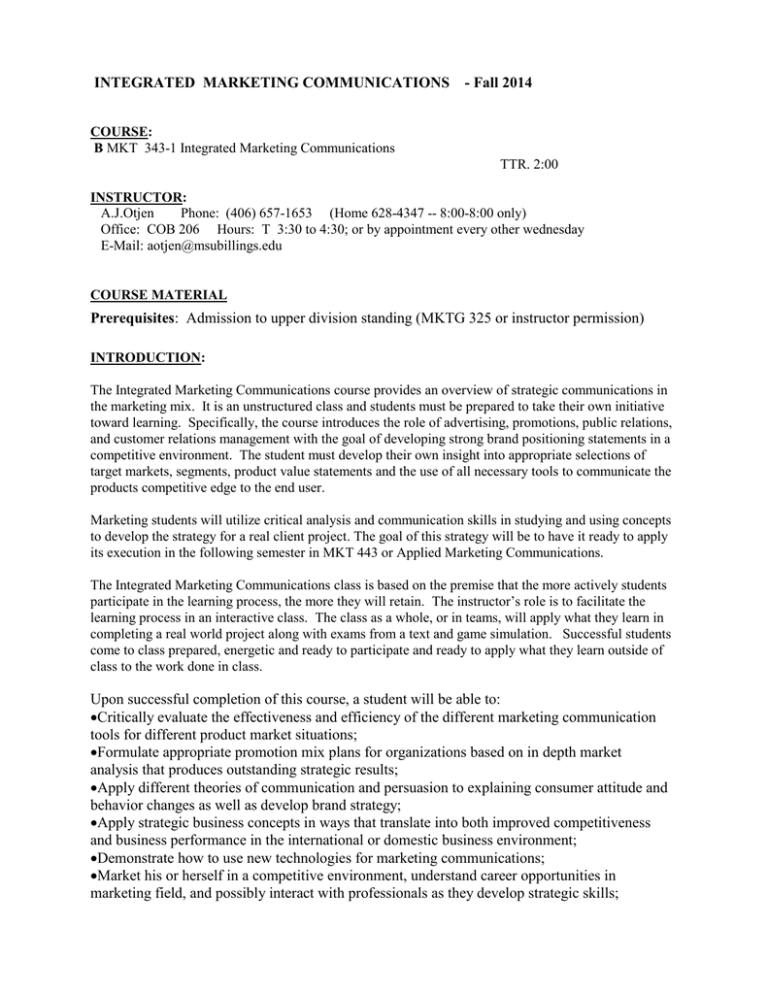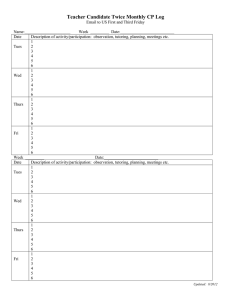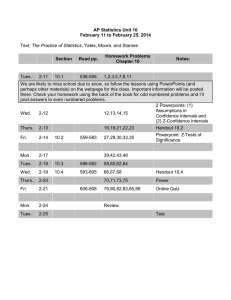INTEGRATED MARKETING COMMUNICATIONS - Fall 2014
advertisement

INTEGRATED MARKETING COMMUNICATIONS - Fall 2014 COURSE: B MKT 343-1 Integrated Marketing Communications TTR. 2:00 INSTRUCTOR: A.J.Otjen Phone: (406) 657-1653 (Home 628-4347 -- 8:00-8:00 only) Office: COB 206 Hours: T 3:30 to 4:30; or by appointment every other wednesday E-Mail: aotjen@msubillings.edu COURSE MATERIAL Prerequisites: Admission to upper division standing (MKTG 325 or instructor permission) INTRODUCTION: The Integrated Marketing Communications course provides an overview of strategic communications in the marketing mix. It is an unstructured class and students must be prepared to take their own initiative toward learning. Specifically, the course introduces the role of advertising, promotions, public relations, and customer relations management with the goal of developing strong brand positioning statements in a competitive environment. The student must develop their own insight into appropriate selections of target markets, segments, product value statements and the use of all necessary tools to communicate the products competitive edge to the end user. Marketing students will utilize critical analysis and communication skills in studying and using concepts to develop the strategy for a real client project. The goal of this strategy will be to have it ready to apply its execution in the following semester in MKT 443 or Applied Marketing Communications. The Integrated Marketing Communications class is based on the premise that the more actively students participate in the learning process, the more they will retain. The instructor’s role is to facilitate the learning process in an interactive class. The class as a whole, or in teams, will apply what they learn in completing a real world project along with exams from a text and game simulation. Successful students come to class prepared, energetic and ready to participate and ready to apply what they learn outside of class to the work done in class. Upon successful completion of this course, a student will be able to: Critically evaluate the effectiveness and efficiency of the different marketing communication tools for different product market situations; Formulate appropriate promotion mix plans for organizations based on in depth market analysis that produces outstanding strategic results; Apply different theories of communication and persuasion to explaining consumer attitude and behavior changes as well as develop brand strategy; Apply strategic business concepts in ways that translate into both improved competitiveness and business performance in the international or domestic business environment; Demonstrate how to use new technologies for marketing communications; Market his or herself in a competitive environment, understand career opportunities in marketing field, and possibly interact with professionals as they develop strategic skills; Critically assess the ethical concerns and considerations involved in marketing communications. The Service Learning Project for this year is the Billings Clinic Childhood Obesity, with assistance from Billings Parks and Rec and Red Lodge Growers Association. Marketing Communications in the Marketing Mix Understanding market segmentations, the overall marketing mix, and how the communications strategy is critical in positioning the product successfully inthe market segment. Understanding where and how the message is delivered to the market. Customer touch points are both physical and time oriented in the life of the customer, playing a critical financial role in the success of the company. The cost of communications is usually the most expensive element in the marketing budget, often in the entire cost of acquisition. Segmenting markets and satisfying needs through understanding demographic and other dimensions of the global consumer market, the behavioral features of the consumer and other market is more scientific than artistic. Understanding how to blend science and art is the foundation of integrated marketing communications. Success must be measured and the financial investment justified in terms of if the strategic message is on target in line with the overall place in the market versus the competition. This must go beyond sales but with brand identity. COB Student Learning Goals BMKT 343 Integrated Marketing Communications will contribute to the development of COB student learning goals by applying the following: (Scale - 10 [low emphasis] to 50 [high emphasis]) Critical Thinking (40) – the student will develop and enhance his or her ability to evaluate models, analyze situations, and apply appropriate concepts in discussing marketing issues and application of theories. Communication (40) –student will improve his or her oral communication skills through interaction with real world problems and the student will improve his or her writing competency through development of alternatives in creative strategy. Quantitative (30) – the student will improve his or her quantitative skills through target market analysis. STUDENT PARTICIPATION: Successful students come to every class and contribute to the learning process. Experience indicates student success is based on keeping current through reading, completing all assignments when due, studying for exams, participating in class activities, and being a productive team member. PERFORMANCE EVALUATION AND GRADING POLICIES 1. Examination: Exam Essay/Short Answer/take home 20% 2. Class Project Real World Communications Plan (reflective notebook) 20% 3. Individual Assignments within Class Project, To be determined by project 40% 4. Written Project 20% Outside Assignment Grades Your final grade in the course is determined on a standard academic scale and recorded as follows: A - 90%+ D - 60% - 69% B – 80% - 89%) F - Less than 60% C - 70% - 79% The plus and minus system is being implemented and the standard percentage scale. THERE IS NO NEGOTIATION ON YOUR FINAL GRADE. GENERAL POLICIES: Do the right thing. Savor the experience. All electronic devices are off during the class period. Out of respect for others, do not plan to eat lunch or snack during the class period. Drinking coffee, water, etc. during class is acceptable. Out of respect for others, be on time. If you are arriving late, let me know in advance and plan to enter with as little disruption as possible. If you are leaving early, let me know and leave with as little disruption as possible. If you leave at all, do not come back. All students are expected to take all exams at the scheduled time. In rare instances, a unit exam may be re-scheduled to accommodate a special need. The circumstances must be documented. Assignments are due on the scheduled dates. Late assignments are NOT ACCEPTED. Incompletes in the course will follow the university policy as published in the general catalog: Incomplete “I” Grade: An Incomplete is given only when a student has been in attendance for at least threefourths of the semester but has been prevented by circumstances beyond his/her control from completing all of the requirements of the course. A student must provide adequate evidence to the instructor as to the reason why he/she was unable to complete the requirements for the course. If a grade of “I” Incomplete has been given, the instructor shall advise the Office of Admissions and Records in writing what the student must do to remove the deficiency. An Incomplete must be made up within one calendar year. An “I” grade is not included in the computation of the GPA. An Incomplete grade not made up in the prescribed length of time automatically becomes an “F” grade. Once the grade of Incomplete has been converted to an “F” grade, the course must be repeated in order for the grade to be changed. Academic misconduct will be handled according to Student Affairs Policies and Procedures, Part IX B.1. (Student Handbook, page 136.) CHEATING POLICY. There is a no tolerance policy for cheating in this class. Anyone suspected of cheating will be investigated. Sufficient proof of cheating will results in an automatic F in the class and a report for disciplinary action by the University which may include expulsion. Students with Disabilities: MSU Billings is committed to providing equal access. If you anticipate barriers related to the format or requirements of this course, please meet with me so that we can discuss ways to ensure your full participation in the course. If you determine that disability-related accommodations are necessary, please contact Disability Support Services (657-2283; located in Room 135 in the College of Education). We can then plan how best to coordinate your accommodations. Academic Support Center: The Academic Support Center of MSU Billings provides tutoring services to support the academic success students. Any MSUB/City College student can utilize the services on either campus. The ASC is staffed with student tutors, professional tutors and instructors who are trained to tutor in a variety of subjects. Tutors are available to assist students with math, writing, reading, anatomy and physiology, and other specialty areas for specific majors. Tutoring services are "free" as they are already paid for as part of your student fees. The ASC hours are as follows: University Campus – Located in the SUB Monday through Thursday, 8 a.m.-7 p.m., Friday, 8 a.m.-5 p.m. Friday, and Sunday nights from 6-9 p.m. City College Campus —Located in the Tech Building Monday through Thursday, 8 a.m.-6 p.m., and Friday, 8 a.m.-5 p.m. The attached Calendar is not a part of the syllabus and is subject to change. BMKT 343 Integrated Marketing Communications Calendar - Fall 2014 CLASS DATE Sept 4, Thurs. 9,Tues 25 Thurs. Introduction Review Plan Define Products and research Plan Define Products and Primary Research Plan SWOT SWOT Set Objectives Research Plan Approval 30 Tues. Oct. 2 Thurs. Review with Clients MECCAS Begin 7 Tues. Perceptual Maps 9 Thurs. 14 Tues. 16 Thurs. 21 Tues. 23 Thurs. 28 Tues. Midterm Due Review Focus Group 11, Thurs. 16 Tues. 18 Thurs. 23 Tues. 30 Thurs. Nov. 4 Tues. Review Clients ACTIVITY Review Assignments /notebook Individual Assignments Literature Review Data Analysis Literature Review Election No Class 6 Thurs. 11 Tues. 13 Thurs. 18 Tues. Prelim Branding Research Results Assignment 1 Due Assignment 2 Due Assignment 3 Due Assignment 4 Due 20 Thurs. Review Problem Def. Assignment 5 Due 25 Tues. Review All, Start PPT Assignment 6 Due 27 Thurs. Holiday No Class Final Presentation to Client Final Presentation to Client Reflective Notebook Dec. 2 Tues. 4 Thurs. Finals Week


